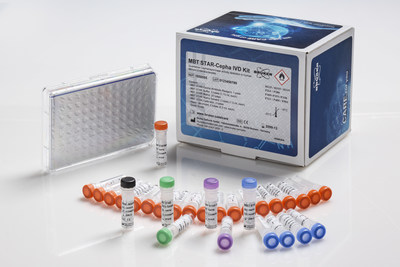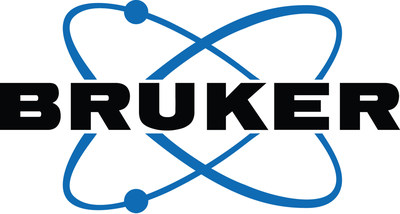60-90 Minute Microbial ID of 2,700 Species from Positive Blood Cultures, Combined with Functional Testing of Cephalosporin- and Carbapenem-Resistance on MALDI Biotyper®, Addresses Clinical Need
MADRID, April 20, 2018 /PRNewswire/ —
- New CE-IVD FastSepsityper® solution:
-
- for MALDI-Biotyper (MBT) identification (ID) of over 2,700 microbial species
- from Positive Blood Cultures (PBC) with less hands-on time;
- Novel CE-IVD MBTSTAR®-Cepha kit:
-
- for rapid, functional antibiotic resistance testing against Cephalosporins
- complementary to existing MBT STAR-Carba kit for fast Carbapenem-resistance testing
- all integrated in 60-90 minute cost-effective Bologna Workflow;
- Further expansion of MBT Library:
-
- for clinical microbiology (CE-IVD) and filamentous fungi (RUO)
- New fast PCR assays for Invasive Fungal Disease (IFD) testing directly from blood without culture:
-
- Fungiplex® Universal (RUO) kit for rapid detection of fungal DNA
- Fungiplex® Aspergillus Azole-R kit (CE-IVD) for Azole-resistance testing in Aspergillus
- complementary to existing Fungiplex Candida and Fungiplex Aspergillus CE-IVD kits for ID;
At the 28th European Congress of Clinical Microbiology and Infectious Diseases (ECCMID 2018), Bruker introduces new diagnostic workflow solutions for rapid and cost-effective microbial identification and antibiotic resistance testing from positive blood cultures – called the integrated Bologna Workflow. Bruker also launches additional molecular assays for comprehensive and fast invasive fungal disease (IFD) testing in blood, without the need for any culturing step.
Rapid and cost-effective positive blood culture (PBC) testing, including broad species identification (ID) and testing for the most important antibiotic resistance mechanisms, are urgent priorities in clinical microbiology, which require routine adoption for optimized patient benefits. The integrated Bologna Workflow for bloodstream infections has recently been introduced at the S. Orsola-Malpighi University Hospital in Bologna, Italy. The spread of resistance against third-generation Cephalosporins and Carbapenems among Gram-negative bacteria poses a high burden on the Italian healthcare system, and this problem is also rapidly increasing elsewhere in Europe. Starting from a PBC in hospital testing for bloodstream infections, Bruker’s new, simplified Fast Sepsityper solution for the MALDI Biotyper(MBT) platform further reduces hands-on time and decreases time-to-result.
The Bologna Workflow combines rapid ID with broad species coverage with the MBT STAR-Carba assay for fast carbapenem-resistance testing, all within 60-90 minutes. An automated warning for carbapenem-resistant Klebsiella pneumoniae (KPC), associated with the blaKPC gene, is performed with an optional MBT subtyping module. For the S. Orsola-Malpighi University Hospital this makes up the majority of KPC cases. KPC-subtyping occurs simultaneously with microbial ID, and a warning is displayed in the research-use-only version (RUO) of the MBT software, which has been validated by the hospital for internal use.
The Bologna Workflow is now further enhanced by the addition of the new MBT STAR-Cepha kit (CE-IVD) for a MALDI-MS-based functional resistance test against third generation cephalosporins.
Due to the continuous expansion and refinements of the MALDI Biotyper reference library (CE-IVD), the Bologna Workflow can now also detect very rare species in a positive blood culture. Bruker is introducing a MBT reference library update at ECCMID, which adds another 239 species across 24 microbial genera. The library update also improves the coverage of biological diversity for many species. For example, it further improves the identification of Candida auris, which is increasingly causing fungal infections in critically ill hospital patients. Candida auris is resistant against a number of antifungal agents and can cause blood stream infections, urinary tract infections and wound infections. Bruker is also introducing the MBT Filamentous Fungi Library 2.0 as a RUO-version with 26 new species.
Miriam Cordovana, in the department of Bacteriology and Mycobacteriology of the S. Orsola-Malpighi University Hospital in Bologna, Italy, stated: “Using the MALDI Biotyper Positive Blood Culture (PBC) workflow, it is now possible to get fast and accurate microorganism identification and resistance detection within 60-90 minutes after a PBC alert, enabling a significantly shorter reporting time in comparison with current routine methods.”
In addition, Bruker is launching the new RUO Fungiplex Universal kit for broad-coverage, real-time PCR testing covering 23 filamentous fungi genera, which complements the existing more specific CE-IVD Fungiplex Candida species ID kit. As a complement to the existing CE-IVD Fungiplex Aspergillus species ID kit, the new Fungiplex Aspergillus Azole-R (CE-IVD) kit now also detects Azole-resistance. All Fungiplex assays are done directly on blood and without any need for cultures, which often grow very slowly, if at all.
This unique and powerful combination of four Fungiplex kits with fast time-to-result within 2-4 hours can now provide infectious disease doctors with a phased, comprehensive workflow for Invasive Fungal Disease (IFD) testing of critically ill patients in the hospital.
Wolfgang Pusch, Executive Vice President for Microbiology & Diagnostics at Bruker Daltonics, commented: “We now offer a very fast, compelling and cost-effective workflow for identification with extremely broad species coverage from positive blood cultures, integrated with rapid functional testing for resistance against carbapenems and cephalosporins, all on the established MALDI Biotyper platform. In contrast to competing syndromic panels for BSI, the Bologna Workflow is cost-effective and suitable for broad clinical adoption. It covers identification of more than 2,700 microbial species, and two of the most important resistance mechanisms for Gram-negative bacteria, all in only 60-90 minutes after the blood culture has been flagged as positive. Optional RUO KPC-subtyping, simultaneous with ID and without additional cost, can provide resistance gene alerts that need to be validated by other methods.”
About the Bruker MALDI Biotyper (MBT) Platform
The MALDI Biotyper enables molecular identification of bacteria, yeasts and fungi. Classification and identification of microorganisms is achieved reliably and quickly using proteomic fingerprinting by high-throughput MALDI-TOF mass spectrometry. The MALDI Biotyper uses a molecular approach based on specific proteomic fingerprints from bacterial strains. Many published studies have highlighted the greater accuracy and lower cost, as well as the typically much faster time-to-result (TTR).
Applications of various MALDI Biotyper solutions include clinical routine microbial identification, environmental and pharmaceutical analysis, taxonomical research, food and consumer product safety and quality control, as well as marine microbiology. In many European and international laboratories the MALDI Biotyper has replaced classical biochemical testing for bacterial identification in the past few years due to the accuracy, speed, extensive species coverage, ease of use and cost effectiveness of the system. Traditional biochemical techniques detect different metabolic properties of microorganisms, can take many hours or even days for completion, and they often lack specificity.
The robust MALDI Biotyper requires minimal sample preparation and offers low consumables cost. The products of the MALDI Biotyper family are available in a research-use-only (RUO) version, as the U.S. FDA-cleared MALDI Biotyper CA System, or in an IVD-CE version according to EU directive EC/98/79. The MALDI Biotyper also has medical device registrations in numerous other countries.
RUO versions of the MALDI Biotyper software allow selected, high-value antimicrobial resistance tests. The CE-IVD MBTSTAR®-Cepha kit now allows rapid, functional antibiotic resistance testing against Cephalosporins, and the CE-IVD MBT STAR-Carba kit is for fast Carbapenem-resistance testing.
About Bruker Corporation (NASDAQ: BRKR)
For more than 55 years, Bruker has enabled scientists to make breakthrough discoveries and develop new applications that improve the quality of human life. Bruker’s high-performance scientific instruments and high-value analytical and diagnostic solutions enable scientists to explore life and materials at molecular, cellular and microscopic levels. In close cooperation with our customers, Bruker is enabling innovation, productivity and customer success in life science molecular research, in applied and pharma applications, in microscopy, nano-analysis and industrial applications, as well as in cell biology, preclinical imaging, clinical phenomics and proteomics research, clinical microbiology and molecular pathology research. For more information, please visit: www.bruker.com
Investor Contact:
Miroslava Minkova
Head of Investor Relations
T: +1 (978) 663–3660, ext. 1479
E: miroslava.minkova@bruker.com
Contact for Media and Customers:
Philip Perry
Bruker Daltonics Division
Tel: +49-172-3137216
E: Philip.Perry@bruker.com
MALDI Biotyper®, MBT STAR®, MBT Sepsityper®, Fungiplex® and Carbaplex® are registered trademarks of Bruker Daltonik GmbH in the European Union and other regions.



![]() View original content with multimedia:http://www.prnewswire.com/news-releases/bruker-introduces-bologna-workflow-for-rapid-and-cost-effective-clinical-microbiology-diagnosis-of-bloodstream-infections-with-broad-species-coverage-300633517.html
View original content with multimedia:http://www.prnewswire.com/news-releases/bruker-introduces-bologna-workflow-for-rapid-and-cost-effective-clinical-microbiology-diagnosis-of-bloodstream-infections-with-broad-species-coverage-300633517.html
SOURCE Bruker Corporation





